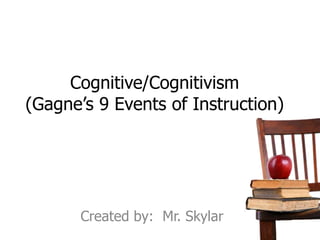Module 13 learning theories (Cognitivism)...
•Als PPTX, PDF herunterladen•
1 gefällt mir•1,047 views
UCF EME 2040 Fall 2011...
Melden
Teilen
Melden
Teilen

Empfohlen
Weitere ähnliche Inhalte
Andere mochten auch
Andere mochten auch (18)
Kürzlich hochgeladen
Making communications land - Are they received and understood as intended? webinar
Thursday 2 May 2024
A joint webinar created by the APM Enabling Change and APM People Interest Networks, this is the third of our three part series on Making Communications Land.
presented by
Ian Cribbes, Director, IMC&T Ltd
@cribbesheet
The link to the write up page and resources of this webinar:
https://www.apm.org.uk/news/making-communications-land-are-they-received-and-understood-as-intended-webinar/
Content description:
How do we ensure that what we have communicated was received and understood as we intended and how do we course correct if it has not.Making communications land - Are they received and understood as intended? we...

Making communications land - Are they received and understood as intended? we...Association for Project Management
Kürzlich hochgeladen (20)
Basic Civil Engineering first year Notes- Chapter 4 Building.pptx

Basic Civil Engineering first year Notes- Chapter 4 Building.pptx
Asian American Pacific Islander Month DDSD 2024.pptx

Asian American Pacific Islander Month DDSD 2024.pptx
UGC NET Paper 1 Mathematical Reasoning & Aptitude.pdf

UGC NET Paper 1 Mathematical Reasoning & Aptitude.pdf
Python Notes for mca i year students osmania university.docx

Python Notes for mca i year students osmania university.docx
General Principles of Intellectual Property: Concepts of Intellectual Proper...

General Principles of Intellectual Property: Concepts of Intellectual Proper...
ICT Role in 21st Century Education & its Challenges.pptx

ICT Role in 21st Century Education & its Challenges.pptx
Making communications land - Are they received and understood as intended? we...

Making communications land - Are they received and understood as intended? we...
Module 13 learning theories (Cognitivism)...
- 1. Cognitive/Cognitivism (Gagne’s 9 Events of Instruction) Created by: Mr. Skylar
- 2. Overview Key people associated… Key points of theory… Classroom implications…
- 3. Key Associated People Merrill (Component Display Theory) Reigeluth (Elaberation Theory) Gagne (9 Events of Instruction) Briggs, Wager, Bruner (Cognitivism Constructionism) Schank (Scripts) Scandura (Structural Learning)
- 4. Key Points of Theory The cognitivist model basically disputes that the “black box” of the mind should be opened and understood. The student is looked at as an information processor (like a computer). Behaviorism was traded for the new cognitivist model in the 1960’s. Cognitivism focuses on the inner mental activities. Opening the “black box” of the human mind is valuable and necessary for understanding how people learn. People are not programmed lab rats that merely respond to environmental stimuli; however, people are rational beings that require active participation in order to learn, and whose actions are a consequence of thinking. Changes in behavior are observed, but only as an indication of what is occurring in the learner’s head. Cognitivism uses the metaphor of the mind as computer: information comes in, is being processed, and leads to certain outcomes.
- 5. Key Points of 9 Events of Instruction 1. Gain attention of the learners… 2. Inform learners of the objective… 3. Stimulate recall of prior learning… 4. Present the stimulus or lesson… 5. Provide learning guidance and instruction… 6. Elicit performance… 7. Provide Feedback… 8. Assess performance… 9. Enhance retention and transfer…
- 6. Classroom Implications Teacher: This theory provides a framework for the instructor with and without technology. Students: This theory presents information in a sequential order to the students in a way to improve their internal process of learning.
- 7. Classroom Implications (cont.) This theory creates a great framework, however it assumes that the learners are passive. But, overall I think it would be an interesting and good theory to practice for my classroom with technology- enriched lesson plans.
- 8. Credits http://www.learning- theories.com/cognitivism.html Integrating Technology and Digital Media in the Classroom (6th Edition) (Shelly, Gunter, Gunter) (I.V.A. Presentation) Microsoft Clip Art